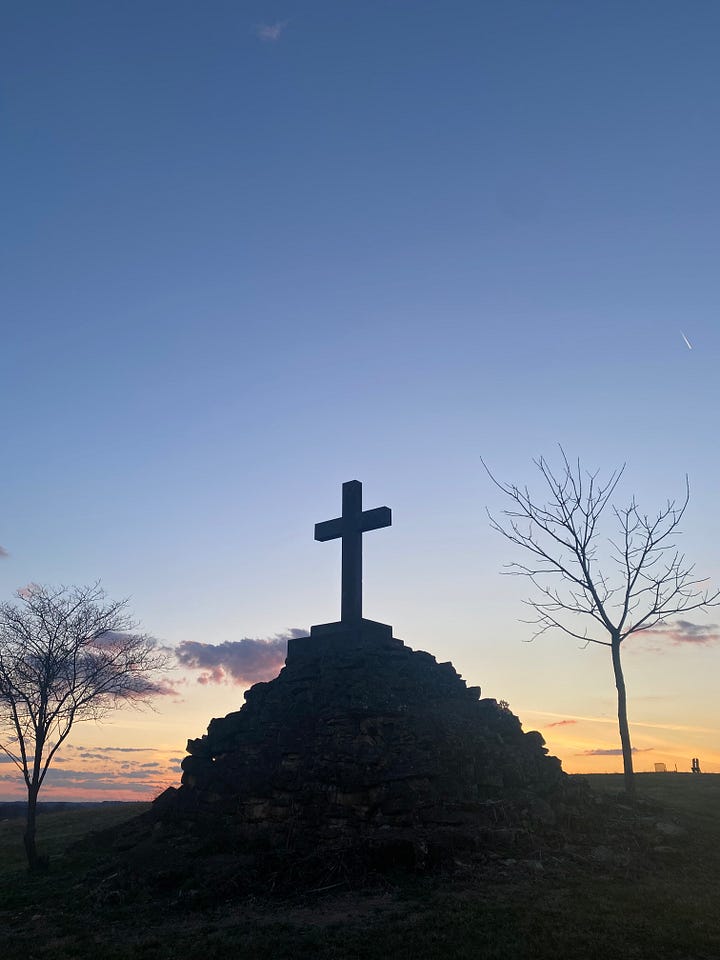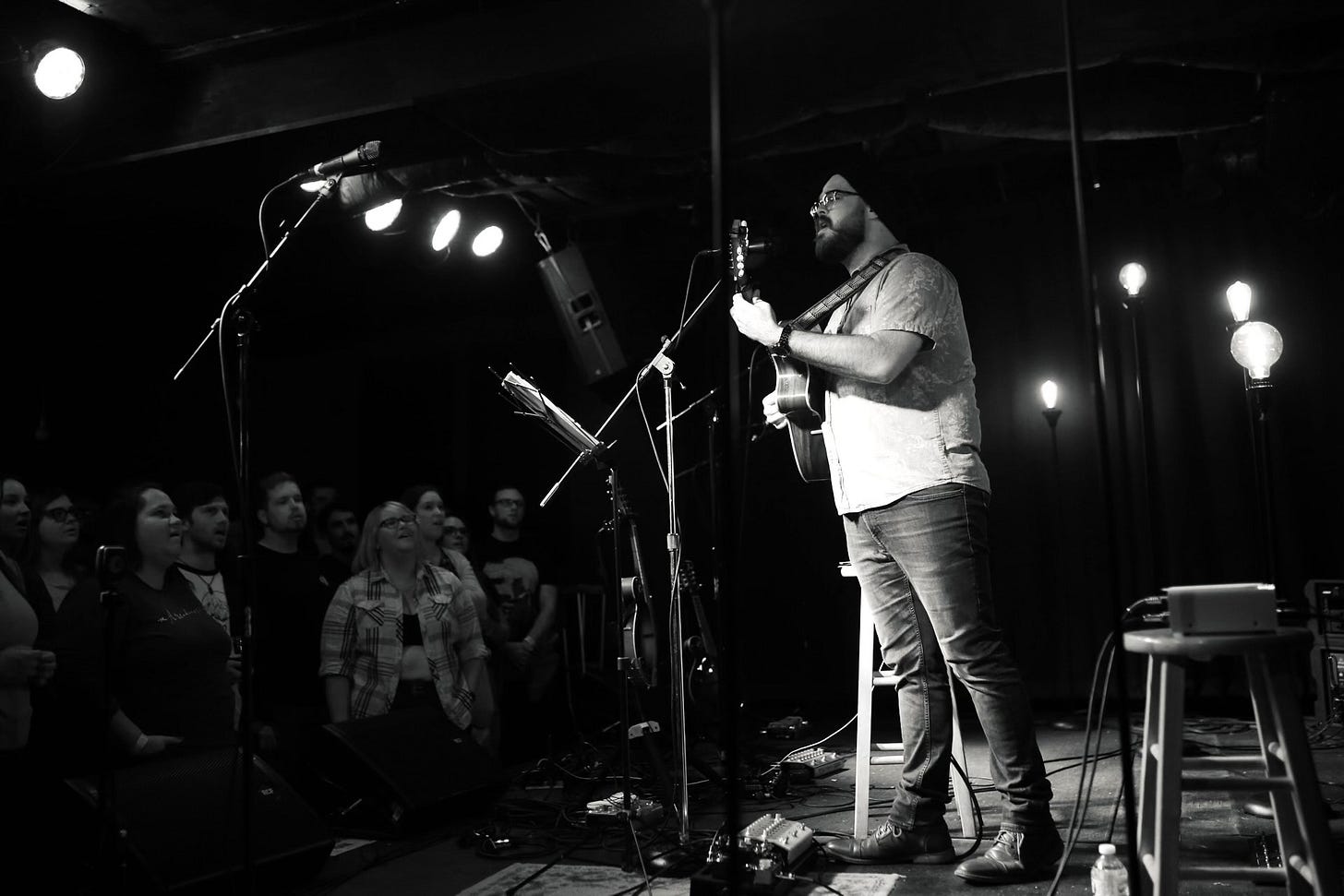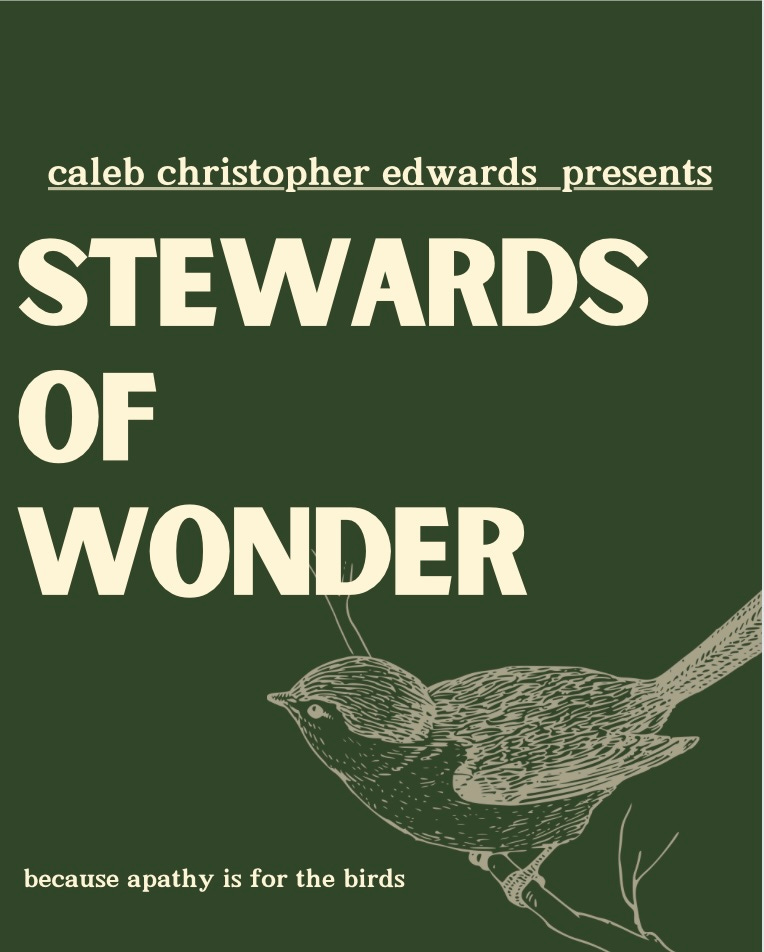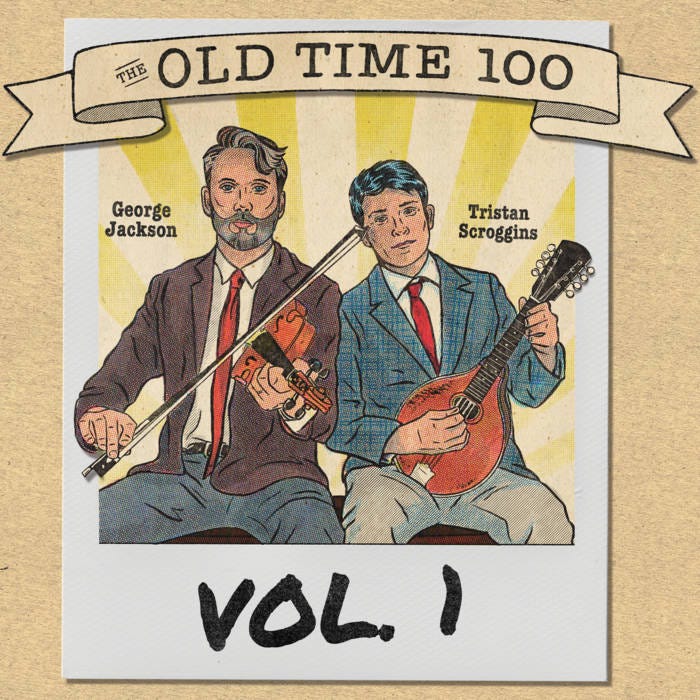Why I Play House Concerts
Chestertonian Thought, Chicken and Dumplings, and the War on Humanity
“There are no uninteresting things, only uninterested people.”
G.K. Chesterton
In 2023, I played the Grand Ole Opry ten times as a sideman. Those ten times were incredible and there is an obvious reason why it is the hub of country music (and the other genres that fall under its umbrella i.e. bluegrass, old time, Western swing, gospel, and contemporary Christian music). Not only is the performance magical, but the staff at the Opry are incredibly professional and kind. They learn not only the artist’s names but the names of their band members and even their family members. The Grand Ole Opry is a special, special place and I am honored to play that stage every chance I get.
The Opry boasts a staggering average of around 2 million listeners1 per program and then another 5,000 or so folks who actually see the show live. I realized at the end of the year that taking that into consideration, I had likely played to over 20 million people over the last year and I was in awe. There really is not another stage that can offer that size of an audience to a bluegrass act (aside from the Late Night shows but I doubt we will see Appalachian Road Show on Jimmy Fallon anytime soon). Playing just one slot on the Grand Ole Opry can result in real, tangible growth and while that is exceptionally remarkable, there is a flip side to that coin: out of those 20 million people, I did not meet a single one of them. This realization felt like a punch to the gut and I began to see what appears to be a huge disconnect between artist and audience. Sometimes that disconnect is mistaken for the awe and mysterious experience of live music (and one of my favorite things about seeing a band play), but I believe there is a more urgent matter at hand. Perhaps the disconnect is between all of us.
I also played a few solo shows last year and those shows were considerably smaller than the ones at the Opry, naturally. Two shows in particular would be considered house concerts and even more than that, they were communal gatherings. A group of people gathered in someone’s home with an artist being the common denominator, much like any other concert but since the space is small, people are forced to acknowledge each other and introduce themselves. The question, “How do you know the artist” is usually asked and before long, two strangers become acquaintances. The room full of new acquaintances sit on sofas or even in the floors and upon first glance, they appear to be as beautifully mismatched as the cupboard full of coffee mugs the host has inevitably looted. Playing in a cramped room with no amplification does something to the relationship between not only the artist and audience member, but to the relationship between the audience members as well. There are no lights or smoke machines. There are no backing tracks or blaring speakers. I would expect this experience for a pop musician to be at best, daunting and at worst, completely impossible to properly execute. This is not so much a critique of pop music as it is a celebration for the completely organic energy that is present in house concerts. The results are entirely humanistic and nearly impossible to compare with playing or attending a show in a live venue; a similar experience I had when it came to eating in my favorite restaurant
Anna and I found this wonderful restaurant in Nashville from the mind of chef, Sean Brock called Audrey and it has been my birthday dinner choice for two years now. It is described as:
“Prevalent in the restaurant’s cuisine is many of Brock’s deepest passions including his heritage growing up in the rural South, Appalachian cuisine, his love of Japanese culture, and the traditions impressed on him from his grandmother, the restaurant’s namesake.”2
I always describe the dishes at Audrey as being “gourmet Appalachian”. It is the food of my childhood and upbringing wrapped up in an artisan experience. While I ate my chicken and dumplings I had this twinge of heartache because it made me miss my own grandmother’s chicken and dumplings. She’s never had access to hand forged truffles from upstate New York so I do not dare to make comparisons, but I realized that I missed the experience of being in my maternal grandmother’s home more than I missed her chicken and dumplings. I missed the cuckoo clock that sings Christmas music (year round), the way her back porch creaks when you walk across it, and the soft wind chimes that sing for the hummingbirds in her flowers. Most of all, I miss her hugs, her inability to hear me, and her genuine interest in Tennessee weather. I miss her humanity. There’s nothing wrong with eating beautiful meals in nice restaurants or seeing big shows in stadiums. They are wonderful experiences in their own right but perhaps they are mere, adaptive replicas of something far deeper, far more beautiful, and far more humanistic.
I consider myself a folk musician more than a bluegrass musician since my career has been rather eclectic. It is also a more accurate title for the kind of experience I try to cultivate. I likely heard folk music for the first time as a child in a circle with my father and his friends. This timeless circle is where my father first heard this kind of music as his father played a D-28 like Jimmy Martin and that is where my grandfather first heard it as his father played clawhammer banjo like Uncle Dave Macon. I am a fourth generation folk musician and if all four generations were still around, we’d have a pretty good band.
I also consider myself to be a faith-based artist. I likely first heard sacred music as an infant attending my first church service at Elm Grove Baptist just a few days after I was born. My cousin Steve was most likely playing a stride-style piano while my aunts and uncles all sang in four part harmony. Aside from that, my paternal grandmother and uncle also play piano in a style that resembles a black gospel style and blues that was around in the 1950’s and 60’s. I am heavily influenced by black gospel which is not something I was even aware of until recently.
I mention all of this to make the point that the origins of the music that I have made a living with for the past twelve years or so is a communal art form. While I love playing huge stages, I am not sure the art form is really made for that. There is a reason why acoustic musicians prefer playing on a microphone instead of plugging into an amplified pickup system; the pickups never sound like the instrument naturally does in a room. I have sound checked in so many places where an electric guitar player would have an amp that was taller than me to get their sound to back row; how in the world is this tiny, eight-stringed lute going to do that without the natural sound being completely replaced by electricity? I am no luddite, but mandolins, fiddles, banjos, and upright basses are meant to be heard in a setting independent of technological aide. Technicalities aside, fiddle tunes and folk ballads are dance numbers and story songs which require a community of people to dance to the fiddle tunes and be able to recognize the local references tucked away in the stories. Sacred music is the same way and ultimately a type of folk music; we sing these songs together in corporate worship as a means to worship our Creator. Folk music and sacred music are not industries. They are human stories. We gather for a common goal that may at first resemble the mutual admiration for an artist but we leave as works of art ourself; a beautiful mosaic of the human experience.
I am not a traditionalist by any means, but I recognize that certain rituals are traditions merely because they were successful in celebrating the human experience. In an era of globalized disconnection, I think these traditions should be recognized. What would happen if we ate more cookies together, drank more tea together, sang more songs together, cried together, laughed together, danced together, and even prayed together? For argument’s sake, we can argue that this practice results in an unremarkable outcome. After all, what I am proposing is not something that will provide much monetary gain, cultural status, or even respect from one’s peers; all of which have been deemed as glorious and righteous pursuits. One might say, “We should stop pursuing these unremarkable practices” to which I would reply: “Then perhaps we are indeed the practiced unremarkable.” If I have learned anything at all in my time, it’s that people are indeed remarkable and the more unremarkable things they do, the more remarkable they become. Chesterton said it best:
“The most extraordinary thing in the world is an ordinary man and an ordinary woman and their ordinary children.” - G.K. Chesterton
So now I have proposed the beauty and the necessity of a house concert, now I will attempt to explain the aforementioned urgency.
The average American spends just over 7 hours a day looking at screens with Gen Z averaging around 9 hours.3 It equals out to nearly two full days a week that is devoted to looking at screens. The effects of this can result in social-emotional development, impaired emotional comprehension, depression, and anxiety4. In 2021, more than 4 in 10 (42%) students felt persistently sad or hopeless and nearly one-third (29%) experienced poor mental health while more than 1 in 5 (22%) students seriously considered attempting suicide and 1 in 10 (10%) attempted suicide.5
While my musical aspirations as a twenty-something were to make money and get famous, I have accepted the fact that I can no longer simply identify as just an entertainer or even just a musician any more than I can identify with the aspirations of fame and fortune. None of these things matter to me anymore. My priorities have changed. It is to do what I can as an artist to help heal a struggling generation or at the very least, to light a candle in the dark night of hopelessness we have found ourselves in. The goal of my shows, whether they are in someone’s living room, a club, a church, or the Grand Ole Opry, is to show you, as an audience member, that you have a purpose, a place in this community, and a seat at the table. In other words: You Matter. We all do. This ties into my aspirations as a person of faith as well. I am not here to convert you, to preach to you, or to lay hands. I am here to simply show you the love and grace that I receive on a daily basis, to show you how you are a beautiful image made by a Good Creator, and to simply share a space with you for an evening because I believe that you’re worth it. This is why as of April 15th, I am no longer working as a full time sideman in a bluegrass band anymore but it’s not to say that I believe that my work in the last decade does not matter or that it was not as important. I am simply saying that the urgency for humanity that has been placed on my heart now exceeds my desires to be a competitive bluegrass musician. I am acknowledging the pain and deep heartache that my brothers and sisters are living through. I am enlisting to fight against the war on our humanity and I am doing it with my mandolin, a few monthly essays, and a deep desire to show you how much you are loved. Euripides, as translated by Anne Carson, said it this way:
Pylades: “I’ll take care of you.”
Orestes: “It’s rotten work.”
Pylades: “Not to me. Not if it’s you.”6
You might be feeling the same way that I do and to that I say this: If you are an artist, start playing house shows. If you’re not, start opening up your doors and start hosting. Your home is not a venue, it is a haven. It is a sanctuary. I want to break bread with you, drink wine with you, sing to the rafters with you, dance with you, and cry with you. I want to be unremarkable with you.
That is why I play house concerts.
Caleb Christopher Edwards
If you or someone you know is interested in hosting click the button below.
See you soon.





On the Road
April 27th - Metamora Mandolin Gathering - Metamora, IN (workshop)
April 28th - Metamora Opry Barn - Metmora, IN (concert)
Updates
I am incredibly excited to announce that on top of My Monthly Musings and Short Stories, I am adding a third publication to the month for paid subscribers. I figured that after a year of talking about wonder, we should talk to some professionals and I have interviewed world class musicians, authors, theologians, comedians, photographers, illustrators, and even a homeschool mom to find out how they steward wonder. Stewards of Wonder will make its debut on April 20th. In the meantime, consider becoming a paid subscriber.
Currently Reading
I bought a copy of this book for $1 at a used book store a few years ago knowing that it was a required read. I had heard so much about it from so many respected artists and friends but when my dear friend, Lincoln came to my home and gushed over its lore and myth, I started it immediately. If you are a fan of soft world building, (more on that term here) then I highly recommend it. The world of the rabbits, the prophecy of young Fiver, and their journey to find a new Warren is an ancient story yet incredibly relevant for our time.
Currently Listening
I have known Tristan Scroggins as a wonderfully articulate artist and amazing mandolinist for a number of years now. This first volume of his with Kiwi fiddler, George Jackson is a wonderful ode to the origins of folk music I mention above. In fact, I listened to this whole album multiple times as I wrote this essay. Listen to it here.
Anne Carson, Grief Lessons: Four Plays by Euripides









I am an introvert that would be happy to hibernated in my house with my dog all the time. I find the music is a way I can venture out and connect with people.